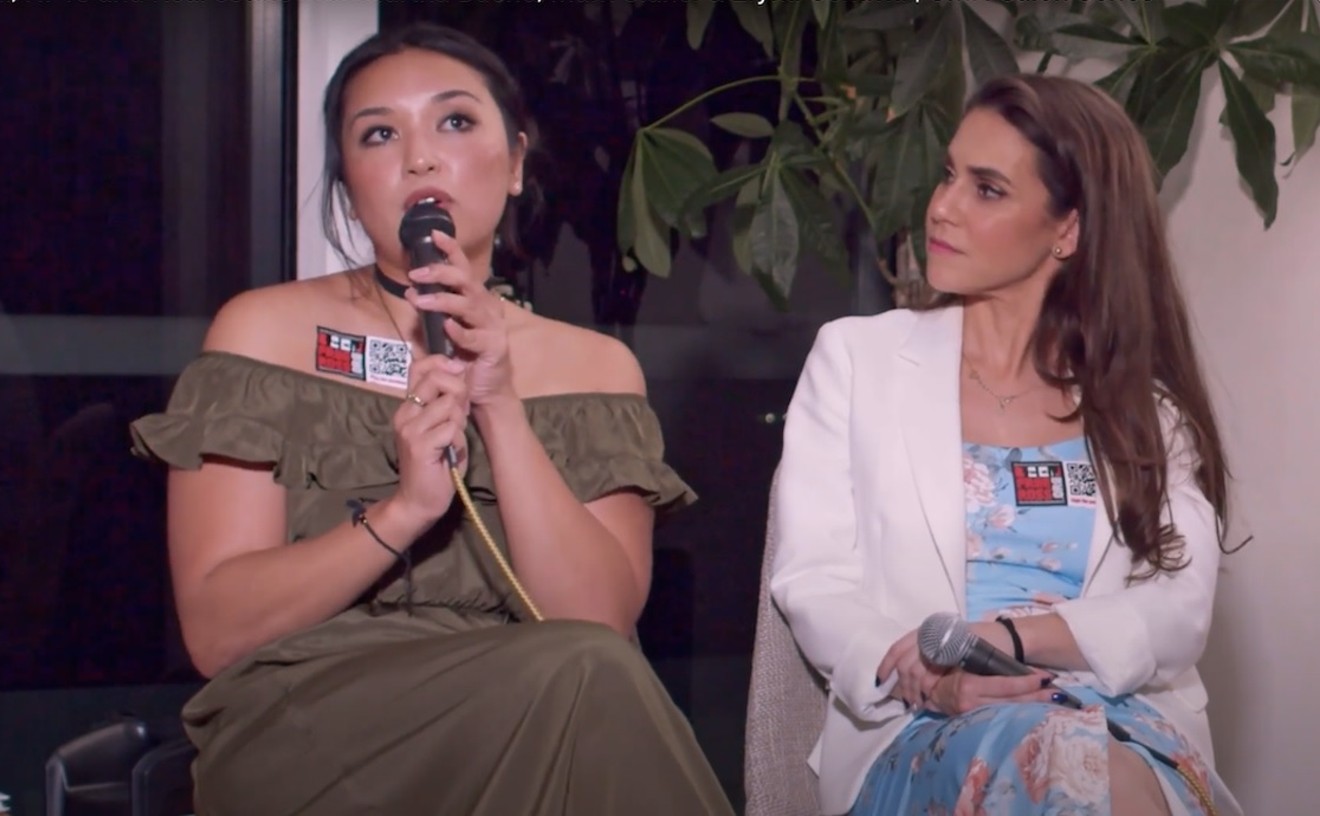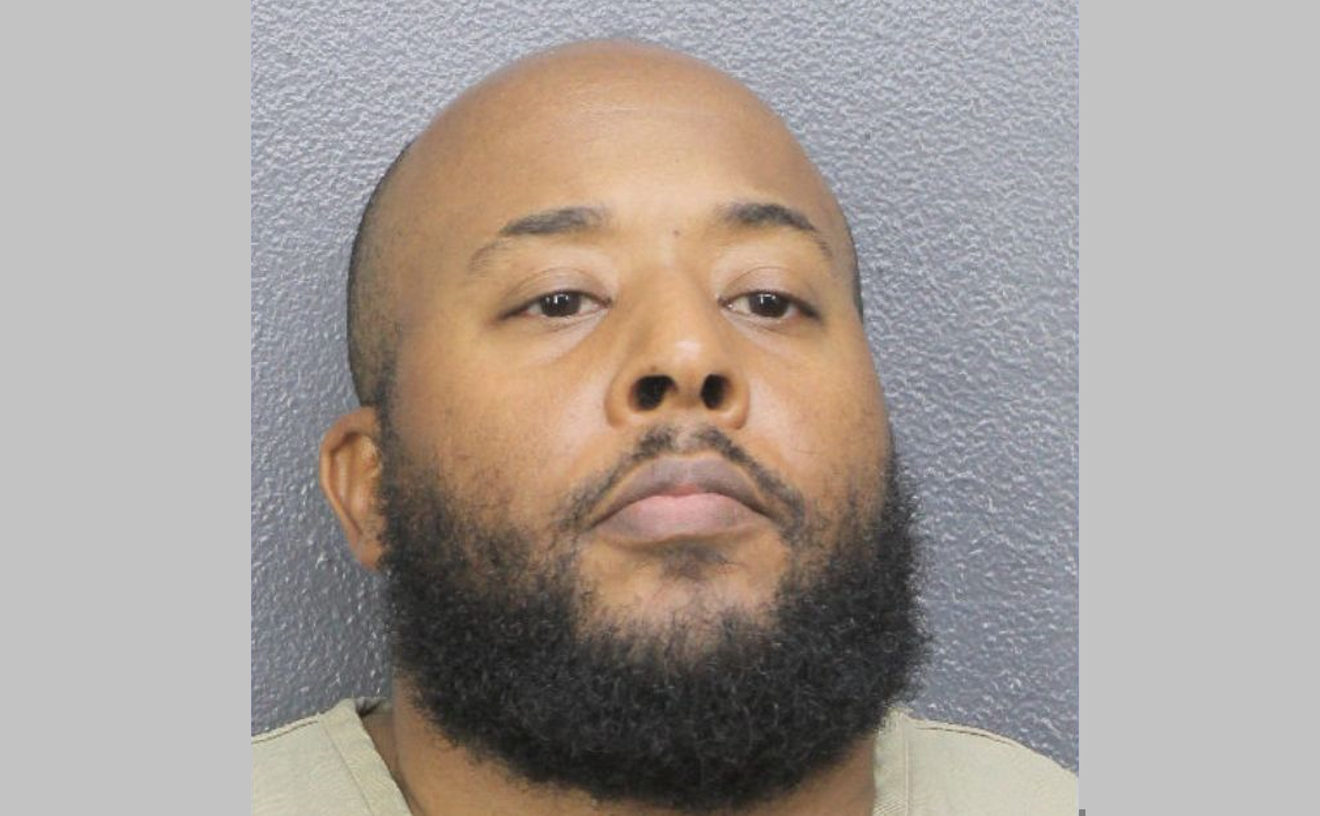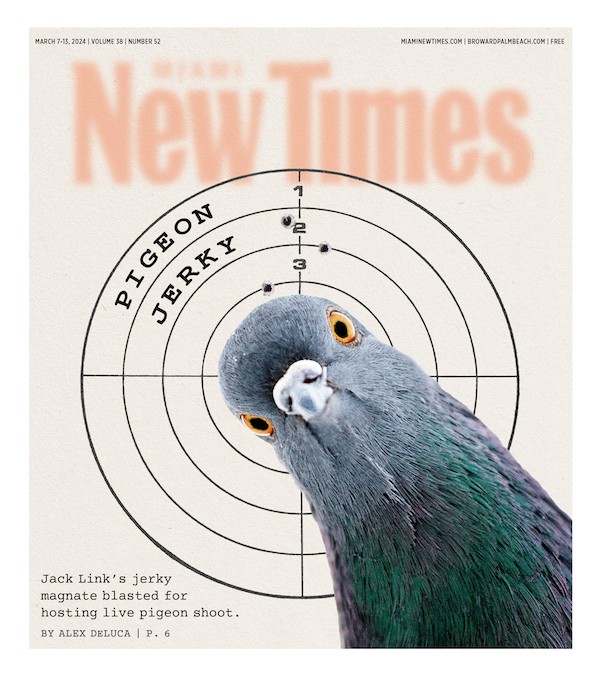Band will leave the office in December after four weeks of vacation. He intends to spend his free time reading and wants to pick up a new book titled Kaddish, about a son's struggle with a parent's death. The title refers to the Jewish prayer of mourning that helps the living cope with loss. Band, whose own father died last year, has loss on his mind these days.
"Life has its disappointments," he says, clasping and unclasping his long fingers. At 46 years old, his face is still youthful under a head of gray hair. "The presumption is your character is measured by how you handle them."
Band is about to find out what he's made of. After twenty years prosecuting cases, he was forced to resign in June following a secretary's accusation that he sexually harassed and fondled her. No one expected this. In 1993 Miami-Dade State Attorney Katherine Fernandez Rundle chose Band to head the major-crimes unit, which handles the county's most complex and sensitive cases. One of Rundle's chief assistants, he coordinated the investigation into Gianni Versace's murder. He led the inquiry of former county Commissioner Joe Gersten. And he has sent countless murderers to prison, including most recently, Juan Chavez, the killer and rapist of nine-year-old Jimmy Ryce. To dozens of lawyers who have passed through the office during his tenure, Band has built a reputation as a caring supervisor with strong ethics.
Given his prominence and record, Band might have weathered the accusations by Sherry Rossbach, a 39-year-old secretary with a blemished personnel record. But they came amid a larger and monumentally embarrassing internal investigation that the press termed the "phone sex scandal." (The moniker promised more than it delivered. It was never proven that any phone sex actually took place.)
The events that toppled Band began to unfold in February, when he asked Rundle to call in a team of special prosecutors from Fort Myers to investigate whether three secretaries, including Band's accuser, had acted improperly. Allegations had been leveled that the secretaries spent hours on the phone with a convicted killer, accepted money from him, and even fell in love with him. It was a tabloid-style scandal and the press wallowed in it.
But when the probe turned to Band, his colleagues were shocked. And when he resigned in June, the broad consensus in the State Attorney's Office (SAO) was that Rundle sacrificed him after a flawed investigation. Fourteen current and former assistant state attorneys, men and women alike, told New Times they believe Band was ousted as a politically expedient way to make the headlines disappear.
"Michael Band is a good lawyer, an ethical lawyer, and a wonderful supervisor," says Ann Lyons, who left the SAO in June for criminal defense work. "I was very disappointed with the way the investigation was handled." Others agree. Michele Block, a former felony division chief who recently changed jobs, also believes the investigation was "inadequate."
Rick Kolodgy, vice president of the county's Police Benevolent Association and a consistent SAO critic, summed it up: "Look, we were no fan of [Rundle's predecessor and now U.S. Attorney General] Janet Reno. But all the feedback we got from her staff was that she was loyal to them. The sentiment was, 'She's good to us, she watches out for us.' With Kathy, we're hearing just the opposite. People are saying, 'We're showing loyalty but we're certainly not getting it in return.' I think Michael Band is a sterling example of that. As soon as he got a little warm, boom, he's dropped."
Band's resignation resounded in an office where discontent is high. More than 30 of the SAO's 280 lawyers have left in the past six months. Although attrition is nothing new (the workload is high and pay relatively low, with a starting salary for prosecutors at $28,000 per year) Band's departure didn't help matters.
"When you don't have support or leadership it's demoralizing," says a prosecutor who departed this past spring. "When this happened with Michael, people were saying 'If this could happen to him, it could happen to any of us.' Now people are jumping ship like rats off the Titanic."
Rundle dismisses her critics. She says morale is high and asserts the recent state of departures is nothing out of the ordinary. Prosecutors and office staff support her just as she supports them, she contends, adding that the number of people New Times talked with represented only a fraction of her staff. "Over 1000 people work here and the majority were not affected by this at all."
As for Band's departure, Rundle says she had to abide by the special prosecutors' findings. "After inviting them in, it would be inappropriate for us to second-guess their results," Rundle says.
Yet Rundle admits the scandal's fallout is significant. Besides Band's resignation, it includes: dismissal of two veteran secretaries for, among other things, accepting gifts from a convicted murderer; firing of a third secretary for forging a co-worker's signature on subpoenas; and scuttling a major murder trial.
Even the Fort Myers prosecutors invited to ferret out the truth have been stained by the case. Investigation critics note that the special prosecutors may have had something to prove regarding sexual harassment. After all, their office paid a female prosecutor $200,000 last year after she sued, claiming one supervisor made sexual advances and another covered it up. The investigators from Fort Myers did not return five messages from New Times seeking comment.
The two people at the scandal's center are Rossbach and the jailed hit man she befriended, Jorge Ayala. And although she was the original focus of the scandal, Rossbach survived unscathed. The special prosecutors vindicated her, and her supervisors reinstated her with back pay.
Rossbach is a slim brunette with hazel eyes who has worked in the SAO for twenty years. In May she claimed Band harassed her for years and that his behavior culminated at the SAO Christmas party this past December, when he fondled her breasts.
Band denies this. Of the fourteen prosecutors contacted by New Times, not one believed Rossbach's story. Interviews with another six present and former SAO staff members also failed to turn up any Rossbach supporters. Most agreed that she likely found an opportune way to avoid the consequences of her liaison with Ayala.
Before his imprisonment, the 41-year-old killer worked for Griselda Blanco, a Colombian immigrant who ran a vast and violent drug network in Miami during the 1980s. He is serving a life sentence for three murders in Dade County. He dodged the death penalty by agreeing to testify against Blanco.
By all accounts Ayala is a jailhouse charmer. He met his wife, Marisol, by telephone in 1994 while serving his murder sentence. After they married, he impregnated her during a prison visit.
Ayala first contacted Rossbach because she was the secretary for Catherine Vogel, the prosecutor on the Blanco case. They quickly struck up a friendship. He called her collect and the pair spent hours on the phone. She cooked for him. She even spoke with him from her home.
Many of Rossbach's job evaluations reflect well on her two decades in the office. Her supervisors cited her as dedicated and organized. Several witnesses complimented the way she helped them. But SAO workers and other colleagues have questioned her credibility and tactics. Among their complaints:
*Rossbach's friend Joe Diaz questioned her comment to investigators that she often discussed Band's harassment with him. Diaz, a former Metro-Dade police officer, told New Times she talked about her problems with co-workers, but never about Band making improper approaches.
*In 1993 secretarial supervisor Bobbie Sweet filed a fourteen-page memo outlining Rossbach's emotional state. "The pattern is so clear," Sweet wrote. "I feel this employee needs to seek professional counseling." Rossbach "felt there was a 'conspiracy' to have her removed from the unit" and alleged that co-workers were hiding paperwork to make her seem unprepared, Sweet said. Though Rossbach claimed she overheard people discussing ways to get her fired, Sweet could find no proof. She concluded Rossbach had "invaded the private conversation of two co-workers," made accusations of sabotage "without any factual basis," and rooted through the trash to find an illegible, torn-up note.
*In 1992 Miami police officer Edward Figueroa claimed Rossbach threatened him in an attempt to win a real estate commission for her husband. After his home was destroyed by Hurricane Andrew, Figueroa discussed a new home purchase with Steve Rossbach, a fellow Miami cop who moonlighted as a realtor. When Figueroa looked at a house without contacting the Rossbachs, he contends Sherry Rossbach demanded a commission anyway. "If you do this, we will sue you and you will lose everything, even the house," she allegedly said, then added: "You forget who I work for. I know many people." Rossbach admitted threatening to sue, but denied mentioning her workplace.
*In 1982, SAO supervisors suspended Rossbach for three days for abusing her position. She admitted using an SAO computer to discover that Steve Rossbach's ex-wife had not paid a traffic citation. Though Sherry Rossbach tried to have the woman arrested, it turned out the record was inaccurate. "You used official criminal justice information ... for personal reasons ... which created the inference of impropriety by an employee of this office," her suspension memo stated.
*Several SAO secretaries claim that Rossbach often threatens to sue when she gets angry. In 1993, for instance, secretary Patty McMahan claims Rossbach threatened to sue her for sabotaging paperwork. And in 1992 she allegedly told a group of secretaries she would sue them for slander if they talked about an investigation involving her sister, according to one of the women present, Mayra Odio.
Rossbach declined to answer New Times's questions about the incidents or her relationship with Band. Her only comment was: "Have you talked to Michael Band? I wonder if he'd have the courage to tell the truth. I'm getting sick to my stomach just thinking about this." Then she referred all comment to her attorney, Robert Rosenblatt. "I think her personnel record is pretty good for twenty years," Rosenblatt says. "Overall, I think it's an outstanding record."
Several prosecutors contacted by New Times agreed that Rossbach's office history would have made it difficult for her to prove a harassment claim against Band. According to one of them: "If this had come in from the outside like any other case, any prosecutor would have looked at the allegation, the timing, and the accuser's history, and written 'No Motion' across that file. I mean, that woman has credibility problems."
You enter the SAO through two glass doors on NW Twelfth Avenue. If you don't work there, security is tight. You first pass through a metal detector, then visit a receptionist who is seated behind a plexiglass window. She requests a photo ID and gives you a pass. After that, a guard checks your pass, and you take an elevator to the second floor. Once there, you pick up a phone and wait for someone to escort you through a locked door, down a gray-carpeted hallway, and through another locked door. Only then are you inside the major-crimes unit, where strategies to dismantle drug gangs and prosecute murderers are plotted.
It was here, in the warren of cubicles where the secretaries sit, that a drama worthy of a prime-time miniseries, filled with jealousy and accusations, played out last winter. It started one day in early 1997 when Ayala called Rossbach to complain about his cell. The description of the events that follow is gleaned from more than 500 pages of statements taken by the Fort Myers special prosecutors unless otherwise noted.
Once Ayala agreed to testify against Blanco, prosecutors and the Metro-Dade homicide detective handling the case, Al Singleton, wanted him to remain cooperative. So they granted him a number of perks, among them unlimited phone access. At the inmate's request a jail guard would wheel a cart with a phone to his cell.
Singleton told Ayala to contact Rossbach, Vogel's secretary, if he needed anything. Rossbach says Vogel told her to "just talk to him and make him happy ... they wanted to make him as happy as they could so that he would testify."
Ayala first called in early 1997 to request another cell. Later he asked to see a dentist. Sometimes he'd leave messages for Singleton about other drug investigations. One day Ayala told Rossbach that his family in Colombia was in trouble, so she patched the call through to his mother. Soon Ayala started calling Rossbach as many as three or four times per day to chat.
According to several witnesses, Rossbach's attachment to Ayala was noticeable by early 1997. They recount long hushed conversations between the secretary and the killer. Sometimes Rossbach shut herself in the office of an absent prosecutor and picked up the phone.
Rossbach tersely describes her relationship with Ayala. "Over the years did you become friends?" one investigator asks. She replies, "Yes. As much friends as we could."
Vogel began to feel uneasy about Rossbach's relationship with the convict: "I felt as though she was on the phone with him too much. I asked her not to be on the phone that much with him." Rossbach's response, according to Vogel: "She would say things like, 'You know, he's not that bad of a guy.' ... I reminded her time and time again that the man was a murderer ... and that she shouldn't be on the phone with him as much as she was."
Sally Weintraub, another major- crimes prosecutor who shared Rossbach as a secretary, also complained about her conversations with Ayala: "I urged her not to spend so much time on the telephone because I felt that some work I had to have done was being neglected."
Other employees talked about Rossbach and Ayala. "It was told to me that she [Rossbach] was obsessed with him," said McMahan, the secretary who complained about Rossbach's threatened lawsuits. Another secretary, Joyce Allen, says it was common gossip among the secretaries that there was more between Rossbach and Ayala than friendship. A mailroom clerk at the SAO remembered cards from Ayala arriving for Rossbach.
Rossbach acknowledges buying colored pencils for Ayala, who fancied himself an artist. She also says she used about $70 of her own money to buy him coffee, dental floss, a pencil sharpener, and paper. But all of that, and the conversations they shared, were merely part of her attempt to keep Ayala content.
Then in fall 1997, Rossbach made a fateful move: She allowed her colleagues to speak with the killer when she was out of the office. Today Raquel Navarro and Barbara Molina-Abad probably wish they had never spoken to Ayala.
Like Rossbach, both Navarro and Molina-Abad were long-time SAO employees. Navarro, a pretty woman in her forties with wavy auburn hair, worked there nineteen years and her personnel record was spotless. For five years before her firing, she received outstanding evaluations. She also had a part-time job working some evenings as a parking attendant at the Miami Arena.
Molina-Abad, a heavy-set woman under a doctor's care for depression, worked in the office seventeen years, with spottier results, largely as a result of her medical condition. Her supervisors had concerns about her organizational and leadership abilities.
Navarro first spoke with Ayala in October 1997, when she answered Rossbach's phone and accepted the collect call. Then Molina-Abad also started taking the calls. Ayala was soon calling as many as twenty times a day to speak with all three women.
In November, after Marisol Ayala was arrested on drug charges, the SAO secretaries came up with a plan to allow the couple to communicate: Marisol and Jorge would call the office at a prearranged time. The secretaries would then place the receivers together and cover them with a sweater to muffle outside noise.
On Thanksgiving Rossbach cooked a turkey dinner for Jorge Ayala and arranged to have it delivered. In December Ayala started sending money to Navarro. She claims not to know his motivation for this. He first sent $150 "to buy Sherry a cassette player for Christmas," Navarro recalled. Next came a $75 money order. Ayala instructed Navarro to use the cash on Christmas gifts: perfume for Vogel and Molina-Abad, ties for Singleton, and a TV Guide subscription for himself in prison. Navarro knew Vogel wouldn't accept the perfume, so she never purchased it. Everyone else took their gift.
Rossbach contended that the $150 from Ayala was reimbursement for items she had purchased.
Rossbach prepared a special Christmas dinner for Ayala and had it delivered. In January she spoke to him from her home while her family was on vacation in North Carolina. On January 28 she baked Ayala a birthday cake.
By this time, Navarro and Molina-Abad had also befriended the killer. "I guess he had no one else to call, so he would call here all the time. ... And he was a nice guy. ... We spoke about Thanksgiving, I spoke to him about my husband, about my daughter, about my job, about Sherry," Navarro recounted. Navarro also discussed Melrose Place and her parking attendant job. He was always respectful, she said.
In January office decorum broke down. It started when Molina-Abad passed the phone to McMahan. Thinking it was Molina-Abad's husband rather than Ayala, McMahan said a few words as a practical joke: "You're not taking care of your wife, she's depressed. You're not doing your husband [sic] duties."
After that, Rossbach stopped speaking to the others, according to Navarro and Molina-Abad. Navarro believed Rossbach was jealous of McMahan. The two had disliked each other for years.
Marisol Ayala became suspicious. She sometimes had to wait to speak to her husband. Navarro and Molina-Abad explained it was difficult to get the phone from Rossbach. Marisol Ayala believed all three secretaries were in love with her husband -- and jealous of each other.
"I'm not a jealous person," Rossbach said. "I've had a lot of problems in this office from jealousy. I've even been told ... that it's not fair that I have the jewelry that I have and the clothes that I have. People make comments all the time that men always are nice to me. Yes, there is a jealousy problem and it's not me."
Rossbach said she was angry with Navarro and Molina-Abad because they talked dirty to Ayala. She didn't think that was proper. "I overheard [Molina-Abad] several times talking about very nasty sexual things with him, yes. ... And I heard Raquel only on one occasion. I mean, I heard her a couple of times ... talking about sex."
Rossbach claimed Molina-Abad became so aroused talking to Ayala that "on one occasion she told me how wet she was and that she had to go to the bathroom because she couldn't take talking to him." Rossbach asserted she confronted Ayala about the behavior. "I told him this was wrong and had to stop."
Both Navarro and Molina-Abad acknowledge Ayala occasionally brought up sexual themes -- he told Navarro he had slept with two women at once -- but deny having phone sex with him.
Soon the gossip spilled from behind the major-crime unit's locked doors. At one point in mid-February, Circuit Court Judge Leslie Rothenberg even heard a rumor that Rossbach was romantically linked to Ayala.
Band first heard about the situation from his secretary, Mercy Esquivel. She told him there were complaints that Rossbach was spending a lot of time on the phone with Ayala. Band began asking questions. One of the first people he approached was Molina-Abad. "He wanted to know what was going on," Molina-Abad reported. "I said, Who cares if they were talking on the phone late at night? ... He wanted to know if maybe [Rossbach] could be hurt by him [Ayala] and if there was anything he could do. He needed to assess the situation."
Then Band interviewed Navarro. She acknowledged that all three secretaries were talking to Ayala. Then she admitted the killer was sending money. She even gave Band a $100 money order from him.
"As soon as they said there was money involved, I went, Whoa. Now it's a possible crime," Band told New Times. He explained the situation to Rundle and recommended an independent investigation. Rundle agreed. On February 28 Governor Lawton Chiles ordered the Twentieth Judicial Circuit State Attorney's Office in Fort Myers to investigate.
Even before the governor's order, Rossbach contacted her lawyer, Rosenblatt, who met with Ayala February 27. The killer signed a statement that exonerated Rossbach. "Although at least two other secretaries in the major-crimes division did use sexually explicit language with me, Sherry Rossbach was not involved," the statement reads.
When the investigators arrived in March, they found the truth an elusive target. There were numerous claims and counterclaims. Rosenblatt soon negotiated transactional immunity for his client, which basically allowed her to speak freely without fear of prosecution. (Independent counsel Kenneth Starr granted Monica Lewinsky the same protection in the Clinton case.) The investigators' motivation for the immunity grant isn't known. It's likely they didn't expect to uncover any criminal wrongdoing and just wanted to get to the bottom of a complicated situation.
When Rossbach began to testify, she implicated her co-workers in a cascade of complaints. Investigators couldn't substantiate the majority of them. Among her claims: Molina-Abad confessed to falling in love with Ayala. Molina-Abad had phone sex with Ayala and told him "I love you." And Molina-Abad talked to Ayala about getting a gun to kill Rossbach.
Molina-Abad denied the accusations.
Rossbach made even more claims about Navarro: Ayala had given her $2000 to buy a Jet Ski. She stole money from the parking lot where she worked part time. She and another secretary, Olga Cabrera, teamed up to have phone sex with Ayala. She smoked marijuana with FBI agents. Rossbach even asserted that Navarro talked about Ayala's penis size and asked the killer how to start an escort agency.
Navarro and Cabrera also rejected those accusations. Navarro even took a polygraph and passed.
Though Rossbach agreed to take a polygraph, she fell ill the day of the test and left work. She never took the test. Rosenblatt says the investigators never called.
Rossbach saved her most stunning accusation for last. At first she was indirect, saying she couldn't approach Band about the problems because he wasn't talking to her. Then the following exchange took place:
Investigator: "Why is Michael not talking to you?"
Rossbach: "Michael sexually assaulted me (crying) and he was very (inaudible)."
Investigator: "Oh gosh. Ah, well let me stop a minute so you can stop crying and get yourself together."
At this point, the investigator stops interviewing Rossbach about Ayala and starts questioning her about Band. Rossbach asserts that for years Band asked to sleep with her. He even wanted to include a girlfriend from Orlando in a menage à trois.
She claims he became aggressive at the major-crimes Christmas party. "I always ask my husband to come because I do feel very uncomfortable with Mr. Band," she says. "He'd tell me, 'You know you want me.' And, um, 'Why'd you bring your husband?' ... And he goes, 'Come on, let's go in the office.' ... I was like, 'Get away from me, Michael.'"
Eventually Rossbach says she entered an office with him. Band stood in front of the door, put his hands on her breasts, and said she needed a "boob job" like his Orlando girlfriend. Then she walked out.
New Times talked to several people who attended the Christmas party. None of them remember Rossbach mentioning the incident or acting uncomfortable around Band. One person, who requested anonymity, even supplied a photograph taken at the party that shows Rossbach, Band, and Navarro embracing. Rossbach, smiling broadly, has both arms around Band.
But the investigators took the allegation seriously. If Rossbach's charges were true, Band had committed simple battery, a misdemeanor. The investigators then tried to verify her claim. They asked Rossbach whom she had told about the harassment before February, when Band started looking into the Ayala matter. Any discussion after that point would be tainted, they reasoned. Among the answers they received:
*Prosecutor Weintraub confirmed that Rossbach had complained about Band, but she couldn't say when.
*Senior trial counsel Abe Laeser strongly denied Rossbach's claim that he had responded, "Sherry, why don't you just give Michael what he wants?" after being told of the harassment. ("It's an absolute lie," Laeser responds.)
*Rossbach's sister Lori Maltz confirmed the claim. She said Sherry told her about the harassment in January. But Maltz's testimony comes with baggage: She was fired from her job as a secretary in the prosecutor's office in 1992 for "conduct unbecoming a state employee."
Investigators didn't reach private investigator Diaz, who denied to New Times that Rossbach told him of the harassment. Rossbach said: "I started to confide in him and tell him that Michael was harassing me and bothering me, and he thought I should do something about it." Diaz responds: "No, that's not correct. Sherry had problems with people in the office on many occasions. But I don't remember any of it having to do with Michael Band fondling her or sexually harassing her, nor do I think he would do such a thing." The investigator contacted him once, then never followed through, he says. Rosenblatt dismisses Diaz's claim. He says the investigator changed his story.
Rosenblatt also says Rossbach sought counseling about the Band affair and that the investigators interviewed her counselor. Band's lawyer Roy Kahn says no such interview took place. New Times couldn't determine the truth of either claim.
Band denied the allegations but refused to take a polygraph. "It was his lawyer's advice that he not take a polygraph," Kahn says. "They're just not reliable." In fact, all of the prosecutors interviewed for this story supported Band's refusal. "Michael's decision not to take a polygraph is consistent with what any lawyer would do," says one former prosecutor. Another attorney asserted that polygraphs are about 50 percent accurate.
Things deteriorated rapidly for the major-crimes unit boss. The investigators took an aggressive tack, Kahn recounts: "They said, 'We find there's enough here to charge you with simple battery.' Then they offered to withhold charges if he resigned." Kahn says he found the case laughable and looked forward to defending Band.
Kahn and Band then met with Rundle. "The state attorney had competing interests," Kahn says. "She cared deeply about a devoted employee. She also cared deeply how the office would appear as this was played out in the papers."
He adds: "She never asked him to stand and fight."
Rundle says Band's decision to resign was "solely between him and the special prosecutors." She says she did not encourage him to resign.
The timing couldn't have been worse. The Chavez trial was about to begin. If the Fort Myers prosecutors filed criminal charges, Band would automatically be suspended from the case.
The deal was struck in June: Band would handle the Chavez prosecution, then step down. On June 15 Rundle fired Molina-Abad and Navarro for conducting inappropriately intimate conversations with Ayala. She also fired Cabrera for forging signatures. The investigators strongly recommended reinstating Rossbach, who had been suspended.
"State Attorney Katherine Rundle rushed to judgment and made a hasty decision motivated by selfish and political reasons by terminating others and reinstating Sherry Rossbach," Navarro says. "What line did we cross that Sherry did not?"
Fallout continued. Orlando prosecutors took over the Blanco case and decided it had been compromised by Ayala's relationship with the secretaries. They offered Blanco a deal. In October she pleaded no contest to three murders in which Ayala implicated her.
Throughout the ordeal friends tried to convince Band not to quit. "A lot of people in the office are mad at Michael for resigning so readily," says one former prosecutor. "He kept saying, 'For the good of the office we must put this behind us. The work we do is too important.' Michael is one of those really good eggs that truly believes he is doing God's work."
Band defends his boss. "Kathy has been my friend for seventeen or eighteen years," he says. "When her father died, I was with her. When my father died, she was there with me. She is a good person." He claims he is not happy that people are using his case to criticize her. "You are going to knock this office and that is unfair. People need to see this office as more than Kathy, and more than myself."
Rundle returns the sentiment. "I'm really disappointed to see him leave. He was a great prosecutor," she says. "I respect Michael's decision."
In October a jury convicted Chavez and recommended the death penalty. That ended Band's career as a prosecutor. Now he's considering private practice.
Band's ordeal might continue. "This case is not over," Rosenblatt vows. He is preparing a sexual harassment civil suit against Band.









